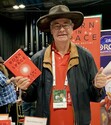Jeremy Clift's Blog
August 7, 2025
What Murderbot Teaches Us About Being Human: Martha Wells at Worldcon 2025
July 11, 2025
Who Do We Think We Are? Identity in an Engineered Age
June 20, 2025
Unlocking the Secrets of the Space Vault
May 18, 2025
Cixin Liu’s destabilizing cosmic vision of the Universe
March 16, 2025
Robert Silverberg: Encountering a Sci-Fi Titan
December 29, 2024
Octavia Butler's 2025 : A Visionary Warning for our Times

The year 2025 looms large in Octavia Butler’s Parable series, a near-future dystopia that feels unsettlingly prescient as we enter the timeline she envisioned. In Parable of the Sower and Parable of the Talents, Butler paints a vivid picture of a society unraveling under the weight of climate change, wealth inequality, and political chaos—issues that feel all too familiar today. By setting her story just a few decades beyond when she was writing (the early 1990s), Butler crafted a world that serves as both a cautionary tale and a stark reflection of humanity’s potential path.
Butler’s choice of 2025 was no accident. It was a deliberate way to force readers to confront the consequences of their actions—or inaction—before it was too late. Her imagined future wasn’t far enough removed to feel like fantasy; it was a near-certainty if society failed to change course. Now, as we live through that once-distant year, the parallels between Butler’s fiction and our reality are impossible to ignore, making her work more relevant and urgent than ever.
Octavia Butler, the child of a housemaid and a shoeshine man, was incredibly shy growing up and spent a lot of her time reading fantasy in the Pasadena public library. But the introvert, who squirreled away thoughts in her pink notebook, went on to reshape science fiction in ways few could have imagined.
Often called the “Mother of Afrofuturism,” Butler was a revolutionary voice, an author who not only wrote herself into a genre dominated by white, male perspectives but also profoundly altered its course. Through her stories, Butler created space for Black protagonists in futuristic narratives, forcing readers to confront pressing social issues through speculative worlds that were daring, imaginative, and deeply humane. Butler’s work did more than entertain; it prompted an urgent dialogue, exploring race, gender, power, and survival within complex, layered characters who weren’t just symbols but fully realized individuals.
For Butler, science fiction was not an escape but a way to engage with reality on a different plane. Through powerful works like Kindred and the Parable series, she illuminated historical trauma, envisioned unsettling futures, and examined human flaws with unsparing honesty. Her stories compel us to ask difficult questions and to consider the lives of people we might otherwise overlook or misunderstand. As a reader, I felt Butler's ability to blend imaginative scope with visceral, human emotion was unparalleled, and her narratives left a lasting mark on me, reshaping how I viewed the potential of science fiction.

Butler also pushed science fiction to be more than just an escape or a showcase of technology. Her books became a space for critical social commentary, often holding a mirror to present-day realities by projecting them into the future or placing them within alternate histories. Her speculative worlds are nuanced explorations of real-world issues like power dynamics, xenophobia, and the survival instinct, which she blended seamlessly with science fiction elements.
Kindred is perhaps Butler's most widely known and powerful work. This novel tells the story of Dana, a modern Black woman who finds herself repeatedly transported to the antebellum South, where she must navigate the brutality of slavery to ensure her own survival and that of her ancestors. Kindred uses time travel, not as an adventure or scientific experiment, but as a device to reveal the enduring legacies of trauma, history, and identity. For Butler, science fiction becomes a lens through which the painful history of American slavery is felt intimately, and readers are brought face-to-face with its lasting scars.
This novel was groundbreaking for me, as it revealed the vast emotional capacity that speculative fiction can hold. Time travel here isn’t a way to avoid reality; it’s a way to confront it. The layers of discomfort, anger, and empathy that Kindred stirs are profound, and it taught me how science fiction could blend historical realism with speculative elements to drive deep emotional impact.
The Parable series, including Parable of the Sower and Parable of the Talents, showcased Butler’s prophetic voice, as she imagined a world ravaged by climate change, economic disparity, and social breakdown. The protagonist, Lauren Olamina, envisions a new religious movement called Earthseed, with the central idea that “God is Change.” Through Earthseed, Butler explores humanity's survival instincts, our adaptability, and our resilience in the face of a crumbling society.

Butler set her Earthseed series in the 2020s as a way to craft a future close enough to feel plausible and urgent. The year 2025 wasn’t chosen arbitrarily—it allowed Butler to explore a society just beyond her contemporary timeline. By doing this, Butler created a speculative world that served as both a warning and a mirror for her readers, highlighting issues that could escalate if left unchecked.
What struck me most about this series is Butler’s vision of faith and community as crucial to survival. Lauren’s journey reveals how survival is as much about spiritual resilience as physical. As a reader, I found myself constantly drawing parallels between Butler’s dystopian America and current realities: environmental crises, social divides, and the ever-present struggle for justice. Her depiction of a society torn apart by greed and cruelty felt prophetic, and it’s a reminder of the role that speculative fiction can play in warning us about the paths we are currently on.
Butler’s brilliance lay in her ability to explore the "What ifs"—what if alien races found humanity as repulsive as we sometimes find each other? What if, in a future dystopia, we were forced to rebuild society from the ground up? In each scenario, Butler’s characters were multidimensional, flawed, and relatable, bringing a depth to science fiction that I still find rare. She didn’t shy away from showing the dark sides of human nature, but she did so with compassion, acknowledging the forces—both societal and internal—that drive people to make unthinkable choices.
Her legacy extends beyond her books. She has inspired countless writers, especially women of color, to explore science fiction as a space for social critique, cultural exploration, and personal expression. She paved the way for a new wave of science fiction that is more inclusive, more aware, and more urgent. Writers such as N.K. Jemisin, Nnedi Okorafor, and Tananarive Due continue in her footsteps, expanding the boundaries of the genre and challenging readers to reimagine the future.
For me, Butler’s work underscores the value of storytelling as a means of survival. Her characters show us that survival isn’t just physical; it’s about holding on to one’s humanity, even in the most dehumanizing conditions. Butler once said that she wrote herself into the stories she wanted to read, and in doing so, she wrote all of us into futures that challenge, unsettle, and inspire. Her work remains a powerful call to envision worlds that go beyond imagination to reflect the deep-rooted realities of our lives, and for that, she will always remain a beacon in the world of science fiction.
Jeremy Clift is a science fiction writer and author of “Born in Space: Unlocking Destiny,” from ElleWon Press.
October 25, 2024
Vernor Vinge: The Visionary Who Reshaped Sci-fi
Vernor Vinge, who died in California this year aged 79, had a lasting influence on science fiction, coining the term ”the singularity.” He was also among the first authors to present a fictional “cyberspace.” When I first stumbled across his work, I had little idea I was about to be introduced to a mind capable of reshaping my understanding of both technology and the human condition.
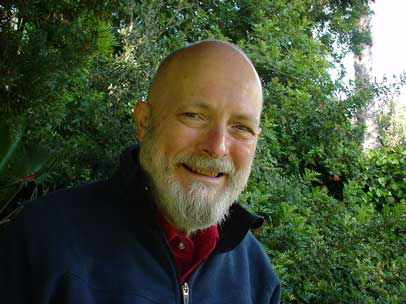
Vinge's visionary storytelling revolves around the concept of the Technological Singularity, the idea that as technology accelerates, it will eventually reach a point beyond which human intelligence can no longer comprehend or predict its future course. What struck me about this wasn’t just the plausibility of the idea—it was how Vinge made it feel so real, so urgent, and yet so human. It resonated deeply because it spoke to our innate curiosity, our fears, and the uncertainty we face as we hurdle toward an unknown technological future.
The breadth of Vernor Vinge's imagination doesn’t just lie in his predictions of the future; it’s in how he blends cutting-edge science with vivid characters and societies. A Fire Upon the Deep introduced me to the Tines, a wolf-like alien species with a group consciousness, something I hadn’t seen before in sci-fi. Their society was so unique, yet eerily relatable. I often thought about how it paralleled our increasing dependence on networks and interconnected technology. We, too, are becoming creatures who rely on group knowledge and collective intelligence, not entirely unlike the Tines.
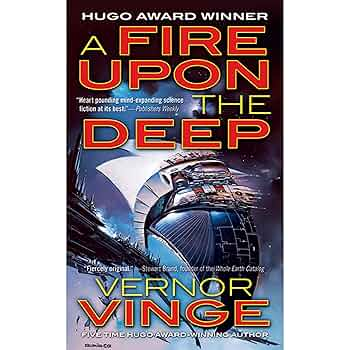
I vividly recall reading The Peace War and marveling at the “bobble technology”—a way of isolating objects or people in time-stopping stasis fields. The idea was so clever, and yet, what made it profound wasn’t the technology itself, but how it reshaped society, war, and human relationships. The moral and philosophical questions Vinge wove into the narrative had me pausing to consider the long-term consequences of what our technological innovations might bring.
Perhaps that’s what makes Vinge stand out to me personally—his ability to look beyond the horizon of human invention and ask, “What will this do to us?” He isn’t content to just show us new worlds, new technologies, or new life forms; he challenges us to consider the moral and emotional implications that come with them. His stories provoke deep thought about the delicate balance between progress and the preservation of humanity, a theme that resonates particularly strongly in our age of rapid technological advancement.
Thinking through his work, I tried to work out the number of ways he influenced sci-fi writing. I came up with seven:
1. The Technological Singularity
Vinge is most famous for popularizing the Technological Singularity—the idea that at some point, artificial intelligence and technology will advance beyond human understanding, radically changing the course of civilization. In a seminal essay in 1993, he posited that this singularity would occur within the coming decades. This concept has been explored by countless science fiction authors since then and remains a foundational theme in both hard science fiction and speculative fiction. It has become a central trope for stories that examine the future of AI, robotics, and transhumanism.
Impact on sci-fi: Vinge’s idea of the Singularity encouraged writers to explore not only advanced technologies but their implications on society and human identity. His work opened the door for more sophisticated explorations of artificial intelligence, machine consciousness, and the moral questions that arise when technology surpasses human intellect.
2. Bringing Realism to Future Technologies
Vinge is often praised for the scientific plausibility of his fiction. A former computer science professor, he grounded his ideas in real technological trends, making his speculative futures seem not only possible but likely. Works like A Fire Upon the Deep and The Peace War showcase advanced technologies such as interstellar networks, autonomous AI, and stasis fields, while exploring how these innovations reshape civilizations, ethics, and human behavior.
Impact on sci-fi: Vinge set a high standard for “hard” science fiction, where the emphasis is on scientific accuracy and extrapolation from current trends. Authors inspired by him tend to build their worlds around plausible, meticulously researched technologies, which gives their stories a sense of realism even in speculative settings.
3. Exploration of Galactic-Scale Civilizations
In A Fire Upon the Deep and A Deepness in the Sky, Vinge introduced readers to the “Zones of Thought”—a galaxy structured by regions of differing technological capability, ranging from simple to god-like intelligence. This imaginative framework allowed him to explore how civilizations might function at vastly different levels of technological progress, all within the same galaxy.

Impact on sci-fi: The Zones of Thought gave writers a fresh way to conceptualize intergalactic societies and explore the diversity of intelligence in the universe. This idea of varied cognitive and technological levels became a blueprint for complex world-building and influenced how authors approach large-scale settings in space opera and speculative fiction.
4. Group Minds and Distributed Intelligence
One of Vinge's most intriguing innovations is his portrayal of group minds, especially the alien species called the Tines in A Fire Upon the Deep. These beings communicate and think collectively, forming higher levels of intelligence only when in close proximity. Vinge’s exploration of distributed intelligence and hive-mind dynamics paved the way for other authors to experiment with similar themes.
Impact on sci-fi: Vinge’s treatment of collective consciousness has inspired many other works that examine non-individual forms of intelligence. His approach not only added complexity to alien life forms but also invited philosophical discussions about the nature of identity, individuality, and consciousness.
5. Philosophical Depth and Moral Complexity
Vinge’s novels often grapple with complex ethical dilemmas that arise from technological advancements. His stories don’t shy away from tough questions about the consequences of creating machines more intelligent than ourselves or the costs of wielding power through technology. The balance between innovation and responsibility is a recurring theme, making his works deeply thought-provoking.
Impact on sci-fi: Vinge set a precedent for blending philosophical depth with thrilling narrative arcs. Many modern science fiction writers, from Charles Stross to Neal Stephenson, have followed his lead in exploring the moral and philosophical consequences of technological progress, often making ethical debates a core component of their stories.
6. Redefining Space Opera
Vinge contributed significantly to the revival of the space opera genre, but he did so by injecting it with rigorous science, intricate plotting, and more complex characters. His novels expanded the scope of what space opera could encompass, from exploring vast, intergalactic conflicts to probing into the intimate effects of technology on personal lives and small societies.
Impact on sci-fi: His reinterpretation of space opera inspired authors like Alastair Reynolds and Iain M. Banks, who combined grand, galaxy-spanning settings with nuanced examinations of humanity’s place in the universe. Vinge showed that space opera could be both sweeping and scientifically grounded, forever altering the expectations of readers and writers within the genre.
7. Inspiring Futurism and Real-World Discourse
Vinge’s influence extends beyond fiction into real-world futurism. His ideas about the Singularity have been discussed in technology circles, shaping the discourse around AI development and future societal shifts. His ability to bridge fiction and reality helped make science fiction a serious medium for exploring plausible futures and societal challenges.
Impact on sci-fi: By engaging with real-world issues in his speculative fiction, Vinge blurred the line between fiction and prediction. His influence encouraged other science fiction writers to engage with contemporary technological concerns, making sci-fi a platform for critical discussions about the future of humanity.
In short, Vernor Vinge reshaped science fiction by bringing a sophisticated understanding of technology, philosophy, and society to the genre. His influence can be seen in the themes and styles of countless contemporary authors who continue to grapple with the ideas he introduced—from AI and singularity theory to the ethical implications of our technological trajectory. For both readers and writers, Vinge’s legacy lies in his ability to provoke deep questions while telling stories that are both imaginative and scientifically compelling.
Jeremy Clift is a science fiction writer and author of “Born in Space: Unlocking Destiny,” from ElleWon Press.
October 7, 2024
Frederik Pohl: A master of Sci-fi Satire
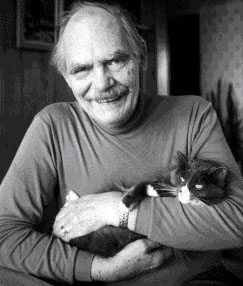
I remember the first time I picked up The Space Merchants by Frederik Pohl. It was a bright orange dog-eared copy I found at a secondhand bookshop, the kind of place where you can smell the musty pages before you even walk through the door. The cover was faded, but it still had that old-school retro charm—spaceships, corporate logos, and a skyline that looked like it belonged to the distant future but was oddly familiar. I had no idea what I was in for, but that moment changed how I viewed science fiction.
When I started reading, it hit me: this wasn’t your typical space opera filled with alien battles or galactic wars. Instead, I found myself lost in a razor-sharp satire about advertising executives controlling the world. It was a future that felt alarmingly close to reality. And that’s when I realized why Frederik Pohl was considered one of the greatest science fiction writers of his time. His ability to weave societal critique with speculative elements was unlike anything I’d encountered.
Pohl (1919–2013) remains one of the most fascinating and influential figures in science fiction. His career, spanning nearly 75 years, saw the genre evolve from pulp to prestige, and Pohl was at the center of it all. With four Hugo Awards, three Nebula Awards, and a plethora of other accolades, his legacy is undeniable. He wasn’t just a writer but also an editor, agent, and critic, helping shape the world of speculative fiction as we know it today.
One thing that always struck me about Pohl’s writing was his ability to predict trends—sometimes with eerie accuracy. He didn’t just write science fiction; he wrote about the direction society might take, often with a satirical edge. His books foresaw environmental crises, corporate dominance, overpopulation, and consumerism in ways that feel more relevant today than ever.
Breakthrough
His breakthrough novel, The Space Merchants, co-written with C.M. Kornbluth in the 1950s, is a perfect example. Written while Pohl was serving in World War II, it paints a world where advertising companies wield more power than governments. In our current era of corporate monopolies and targeted advertising, the book feels less like fiction and more like a commentary on modern life. Pohl's incisive, biting satire elevates the novel to a timeless status.

Pohl worked under various pseudonyms, including Charles Satterfield, Paul Flehr, Ernst Mason, and Jordan Park (the latter for his collaborations with Kornbluth). This allowed him the freedom to explore different styles and ideas without the baggage of his established name. His collaborative work, especially The Last Theorem with Arthur C. Clarke, exemplifies his openness to new ideas and the importance of teamwork in pushing the boundaries of sci-fi.
I find it fascinating how Pohl could move seamlessly between pessimistic satire and optimistic futurism. His ability to switch between tones made his works more nuanced than many of his peers. For instance, in Gateway, he presented a stark, sometimes grim take on humanity’s encounter with alien technology and its cost, while still leaving room for wonder about the vastness of the universe.
The big questions
What I appreciate most about Pohl is his willingness to delve into the ethical and philosophical questions behind his imagined futures. His works often wrestle with big questions: What does it mean to be human in an increasingly mechanized world? How will unchecked consumerism shape our society? These are questions still relevant today, and Pohl’s insights offer no easy answers, which is why his books have stayed with me for so long.

In conclusion, Frederik Pohl was not only a science fiction writer; he was a visionary. His work has influenced countless authors and continues to resonate with readers today. Whether through his early satire of corporate greed or his later explorations of human nature in the face of technology, Pohl’s legacy is should be celebrated and studied by anyone who loves the genre.
For me, reading Pohl is like getting a glimpse of both the future and the present, and his work challenges us to think critically about the world we live in.
Jeremy Clift is a science fiction writer and author of “Born in Space: Unlocking Destiny,” from ElleWon Press.
September 14, 2024
'Born in Space' on Audible
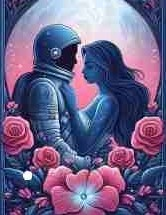
Travel through the cosmos from the luxury of your armchair listening to the captivating audio book version of the epic sci-fi novel 'Born in Space,' now on Audible.

Read by the incredible Gabrielle Gumbs-Gordon, you can journey with Teagan Ward as she makes agonizing decisions about the future of her babies, born in a rotating space lab.
The seven infants, conceived artificially in an experiment to populate the solar system, become enmeshed in a battle for the immense resources of interstellar space, including an ancient stone that could be the key to unlocking the mysteries of the universe. Watch the video below:
Can Teagan get her babies back or will powerful interests sweep her aside in the scramble for the riches of the asteroids?
© Jeremy Clift and ElleWon Press, 2024.
August 28, 2024
Call him Al not HAL. Alastair Reynolds’ journey to the stars
Alastair Reynolds is a name that stands out in science fiction, not just for his compelling narratives but for the deep, authentic scientific grounding that underpins his work. Starting out as an astrophysicist, he says on his own website that he “turned from studying pulsars and binary stars to fiction.“ And since the switch, he has written a lot of it.
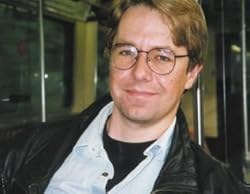
Before delving into writing, Reynolds earned a PhD in astrophysics and worked with the European Space Agency until 2004. This background is more than just a badge of credibility; it infuses his stories with a sense of realism that’s hard to match.
When I first picked up Revelation Space, I was struck by the way he wove complex scientific concepts into a thrilling narrative without sacrificing the sense of wonder that makes science fiction so compelling. It's this balance between the hard science and the sweeping space opera that sets apart the work of this Welsh writer.
A healthy skepticism
Reynolds is known for his adherence to realistic science in his books. He’s famously skeptical of faster-than-light travel, a staple in many sci-fi universes, which he doesn’t believe will ever be possible. This skepticism isn’t a limitation, though; it’s a challenge that pushes him to find other, more plausible ways to explore the vastness of space. When necessary for the story, he’s willing to bend the rules—embracing what he considers “impossible” science to serve the narrative. This pragmatic approach allows his work to stay grounded while still pushing the boundaries of imagination.
I was particularly intrigued when I learned that two of Reynolds’ short stories, “Zima Blue” and “Beyond the Aquila Rift,” were adapted into episodes for Netflix’s animated anthology Love, Death & Robots. Watching those episodes, I felt a sense of familiarity and excitement, seeing how the themes and tones that I loved in his writing translated to the screen. The visual adaptation captured the essence of his storytelling—the blend of human emotion and stark, sometimes brutal, realities of the universe.
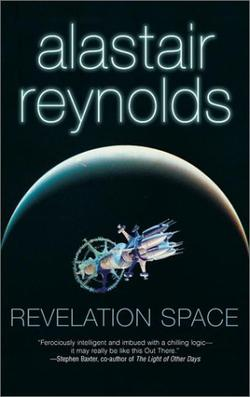
Reynolds has built a universe in his Revelation Space novels that feels as vast and intricate as the cosmos itself. The series includes Revelation Space, Redemption Ark, Absolution Gap, Inhibitor Phase, and other related works like Chasm City, The Prefect, and Elysium Fire. These books aren’t just stories; they’re explorations of big ideas—life, death, consciousness, and the survival of civilizations against overwhelming odds. The way Reynolds interweaves these concepts with detailed, believable science makes his work a masterclass in the genre.
I remember reading Redemption Ark and being blown away by how Reynolds managed to escalate the stakes without losing sight of the personal stories at the heart of the narrative. His characters are flawed, complex, and deeply human, even when they’re grappling with alien technologies or facing existential threats.
A human touch
Reynolds’ blog reveals a down-to-earth side of the author that’s both refreshing and endearing. After attending the 2024 WorldCon in Glasgow, he was busy training for the half marathon in Cardiff, Wales. He’s quick to note that it’s fine to call him Al, a reminder that even the most esteemed writers are people first. It’s a sentiment that resonates with me as I navigate my own journey as a sci-fi writer.
In the end, Alastair Reynolds represents the best of what science fiction can be: a genre where imagination and intellect collide, creating worlds that challenge us to think deeply about our own. His work is a reminder that the universe is vast, our understanding is limited, but our capacity to wonder and dream is infinite.
Jeremy Clift is a science fiction writer and author of “Born in Space: Unlocking Destiny,” from ElleWon Press.

